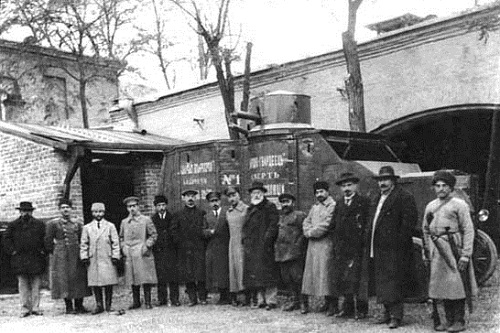| The Republic, Slain |
| Civil Georgia, Tbilisi / 25 Feb.'18 / 11:15 |

Noe Zhordania, head of the Government of the Democratic Republic of Georgia (sixth from the right), together with government officials and military officers. Photo: photomuseum.org.ge
It was on this day, February 25, 97 years ago, in 1921 when one of the world’s worst totalitarian Empires has forced itself on the Democratic Republic of Georgia, effectively ending its fledgling statehood.
In the decades that followed, blood and tears were shed aplenty. Executions of the independent government officials, army and security officers, aristocracy and clergy have followed the Soviet occupation and lasted well into late 1920s, and then continued abroad, when most prominent figures were pursued in emigration.
This was followed by the purge of the Georgian Communist Party leadership already in late 1920s to mid-1930s, then the notorious purge of 1937, then the World War II, where by some estimates over two hundred thousand Georgians perished.
It was in this bacchanalia of terror that the Republic had truly died. So did its best and brightest; with social ties that linked the communities together; with hope and aspirations for better future for all.
Where there was optimism and often even reckless idealism of 1918-1921, deep fear bred suspicion and cynicism in the years ahead. The professional and ideological rigor of the government of the First Republic, was replaced by arrogance of the cadre Communists, by thuggishness and brutality of the KGB executioners.
But most importantly, social empathy and solidarity, which let the cooperative communities and interest groups flourish in the First Republic, that laid foundation to the first Georgian University, was now gone.
The reality of the totalitarian state in a small country like Georgia meant that most people left alive were victims, butchers, and sometimes – both, depending on the period of history and particular twists of faith. Soviet people trust nobody and nothing, especially the kindness of strangers.
The Georgian state has sprung from the ashes of USSR in 1991. The path has been painful. Still, the nation has survived.
But the Republic can never be again, unless we recover that solidarity with our fellow citizens, generate trust in our common future and move forward with a sense of common purpose, expressed in and through our Statehood.
Unless we, as citizens care about those who are too weak or too disadvantaged, the government that we elect never can. Unless we, as citizens, care about security of our neighborhoods and our neighbors, the police that we employ can never secure us. Unless we, as citizens, learn to choose our friends and recognize enemies outside our borders, the leaders that we elect will forever dither.
The Republic cannot exist unless it is first imagined by its citizens. Only then, out of this shared dream it can come alive, gradually, but tangibly and durably.
Georgia was lucky by 1918 to have the whole legion of clever, educated, dedicated, professional daughters and sons that have imagined this commonwealth and expressed their hope and objective in the First Constitution, passed under the accompaniment of cannonade of the battle of Tbilisi on February 21, 1921. The lives of most of these young men and women were cut short, too short to make their imaginary Republic a reality.
But the new generation can reach to their ideas, and we should do so without the cynicism that got so deeply engrained into our psyche. While the political fashions may have changed, the imagined Republic shall always fly the banner of human progress, individual liberty, and solidarity towards the oppressed.
Time to make those words, left hollow by the totalitarian rule, ring true again.
Time for the Republic, reborn.
